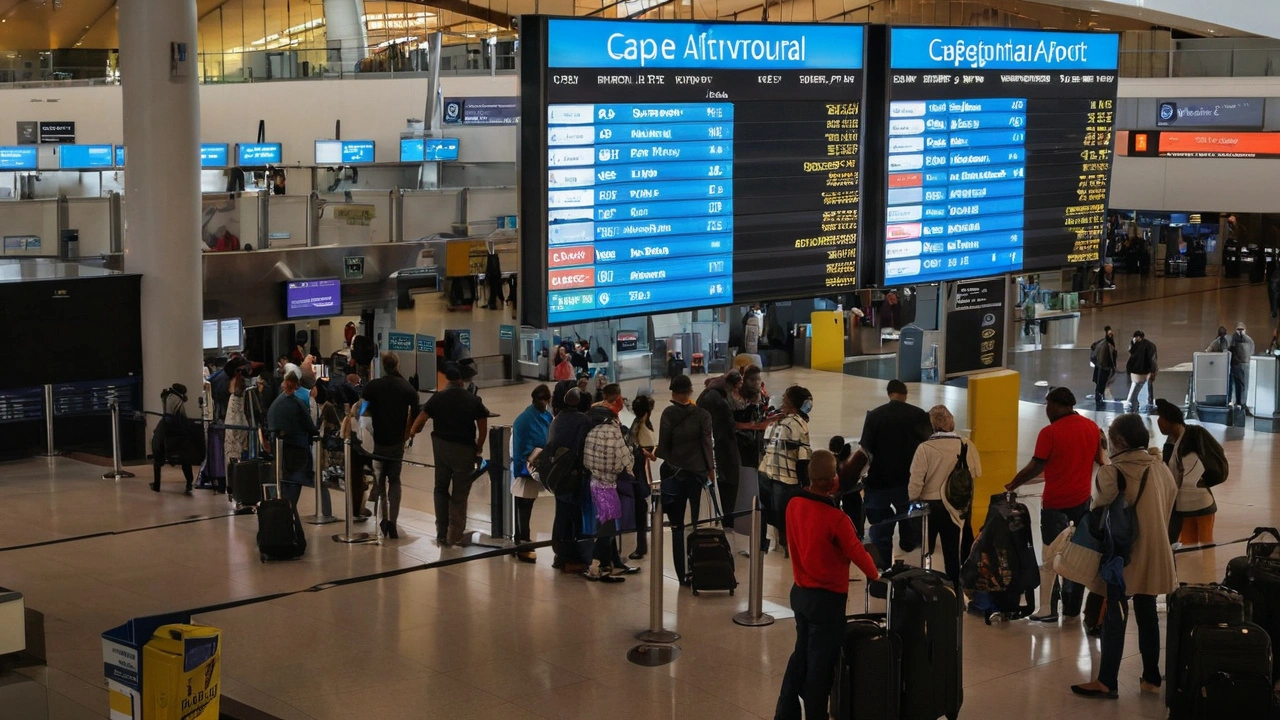On Sunday, Cape Town International Airport experienced a significant power outage that led to severe disruption in flight operations. The outage affected crucial services at the airport, including the runway lights, airside fire rescue, and air traffic navigation systems, resulting in a temporary suspension of flights. Both domestic and international flights were impacted, causing a ripple effect through the airline industry and inconveniencing thousands of travelers.
The disruption began during the busy travel hours, leading to chaos and confusion among passengers. Without functioning runway lights and other essential equipment, flights were unable to either land or take off, forcing airlines to divert to alternative airports or delay departures. The power failure not only marred the travel plans of many but also posed significant safety risks that required immediate attention.
A team of technicians and specialists from the Airports Company South Africa (ACSA) was quickly mobilized to diagnose and rectify the problem. Their primary goal was to restore the power supply as swiftly and safely as possible, ensuring that air traffic could resume with minimal further delay. The cause of the outage was rigorously investigated, with initial findings suggesting it might be linked to issues within the airport's electrical infrastructure.
By 01:00 on Monday, their efforts bore fruit, and the power supply was successfully restored. This allowed for the safe landing of eleven aircraft that had been en route to Cape Town International Airport. Among these flights was FlySafair FA624, which had been diverted to Dawid Stuurman International Airport in Gqeberha but was eventually able to reach its intended destination.
The ACSA issued a public apology for the inconvenience caused by the outage. They assured passengers that every measure was being taken to both address and prevent such disruptions in the future. Travelers were advised to stay informed about their flight statuses through mobile apps and live updates to minimize further inconvenience. Meanwhile, permanent repairs are ongoing. Technicians need a specific window of opportunity to complete this work without disrupting current flight schedules further.
This incident has underscored the significant reliance on seamless electrical supply and infrastructure to ensure the smooth operation of major airports. It has also highlighted the pressing need for robust contingency plans to manage such unforeseen disruptions. The airport management has reiterated their commitment to upgrading the infrastructure to prevent similar occurrences, ensuring that all systems are equipped to handle such emergencies efficiently.
For many passengers, the experience was a stark reminder of the fragility of air travel systems. The sudden jolt to their travel plans left many scrambling for information and alternate arrangements, with some spending hours in uncertainty. The situation at Cape Town International Airport serves as a critical lesson in emergency preparedness and communication.
As Cape Town International Airport continues its ongoing repairs and upgrades, passengers and airlines alike will be watching closely to see how these improvements translate into smoother, more reliable operations. The importance of having resilient infrastructure and effective emergency response protocols cannot be overstated, and this incident has only reinforced the necessity of these measures. Despite the challenges faced, the quick response and eventual resolution of the power outage have been commendable, showcasing the dedication of airport staff and technicians.
The impact on airlines was also notable, with many having to adapt schedules and manage passenger communications amid the uncertainty. Airlines are now reviewing their contingency plans to better deal with similar disruptions in the future. This proactive approach is crucial in maintaining passenger trust and ensuring the viability of flight operations during unexpected events.
In the wake of this incident, ACSA and Cape Town International Airport are taking stock of their emergency preparedness and infrastructure capabilities. This evaluation process is essential to identify vulnerabilities and implement improvements that will bolster the airport's resilience against future disruptions. Through these efforts, the airport aims to enhance its service reliability and ensure the safety and satisfaction of all travelers.






This is exactly why we need decentralized power systems at critical infrastructure hubs. Relying on a single grid is a recipe for disaster. Solar backups with battery arrays should be mandatory for airports, not optional. We've had the tech for years.
LMAO so the airport couldn't handle a power outage? 🤡 Next they'll tell us water doesn't wet things. This is why I don't fly through Africa. My phone has more reliable power than this airport.
I was stuck at this airport last year during a blackout. The staff were angels. No AC, no lights, but they handed out water and snacks like it was a festival. People were singing Bollywood songs to keep spirits up. We made friends. It was chaos... but beautiful.
I'm glad the power was restored, and I appreciate the quick response from ACSA... but... I'm still concerned. How many other systems are similarly vulnerable? The runway lights, the navigation... what about the baggage handling? Are we sure everything's fully operational?
Oh wow. A power outage. How original. Next you'll tell me the sun rises in the east and water is wet. This is why your country's infrastructure is a joke. I've seen more reliable power in a rural Indian village than this 'international' airport.
If you're interested in how airports can improve resilience, I've studied several case studies from Singapore and Frankfurt. They use microgrids with solar + diesel hybrids, and automated failovers. The tech exists. It's about funding and prioritization. Happy to share the papers if anyone wants.
I can't imagine how terrifying it must have been for passengers, especially those with anxiety or medical needs. The silence of a dark airport... it's not just inconvenience, it's emotional trauma. They should have had mental health responders on standby.
This is a wake-up call for every major airport globally. We think we're safe because we're modern, but modern just means we're more dependent. The real test isn't how fast you fix it-it's how many backups you had before it broke.
The language used in the official statement was overly euphemistic. 'Severe disruption' is a euphemism for chaos. 'Ripple effect' is corporate doublespeak for thousands of people stranded. They need to speak plainly, not politely.
It is imperative that the management of Cape Town International Airport undertake a comprehensive review of its energy infrastructure, with particular attention to redundancy protocols and fail-safe mechanisms, as stipulated by ICAO Annex 14. The current configuration is demonstrably non-compliant with international best practices.
I'm so proud of the team who worked through the night!! 🙌👏 The fact that 11 planes landed safely after all that? That's pure grit. We need more heroes like them in the world. 💪✨
power went out planes landed later cool
Yeah sure. They 'restored' power. But did they fix the root cause? Or just slapped a bandaid on a broken leg and called it a day? I'll believe it when I see a public report with actual data.
Cape Town's airport staff are unsung heroes. In the dark, they kept people calm, guided them, and made sure no one was left behind. That's leadership. Not tech. Not money. Heart.
I'm just glad everyone made it home safe 🤞 I know it was scary but the fact that they fixed it so fast? That's the kind of thing you don't hear about enough. Shoutout to the tech crew!! 🙌
everything is connected. when one thing breaks, everything shakes. like when your heart stops, your body knows. same with airports. they forgot to check the wires.
So the airport had a blackout and now they're 'reviewing' things? That's like saying 'oops, our house burned down, let's think about buying a fire extinguisher next year.'
Shoutout to the crew who worked through the night 💪 The real MVPs never get the spotlight. Respect.